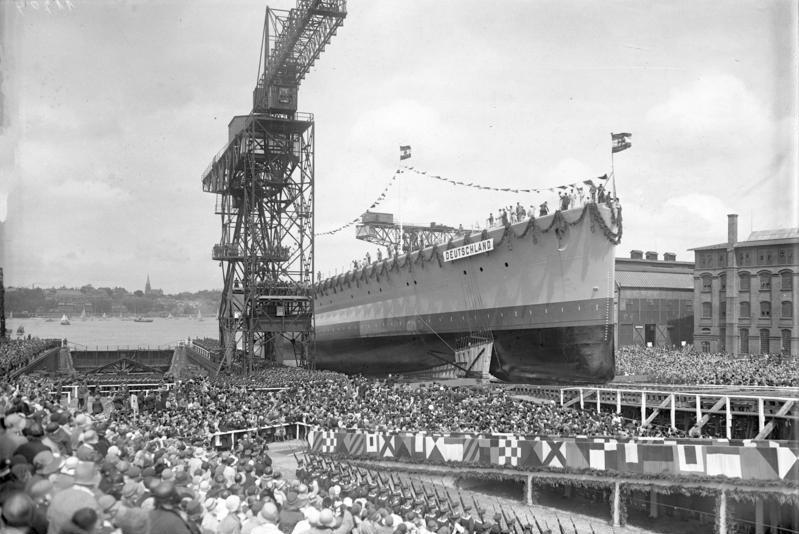May 19, 1931
Deutschland was the lead ship of her class of heavy cruisers (often termed pocket battleships) which served with the Kriegsmarine of Nazi Germany during World War II. Ordered by the Weimar government for the Reichsmarine. Deutschland was ordered by the Reichsmarine from the Deutsche Werke shipyard in Kiel as Ersatz Preussen, a replacement for the old pre-dreadnought battleship Preussen. Her keel was laid on 5 February 1929, under construction number 219. The ship was launched on May 19, 1931; at her launching, she was christened by German Chancellor Heinrich Brüning. The ship accidentally started sliding down the slipway while Brüning was giving his christening speech. After the completion of fitting out work, initial sea trials began in November 1932. The ship was commissioned into the Reichsmarine on April 1, 1933.
Originally classified as an armored ship (Panzerschiff) by the Reichsmarine, in February 1940 the Germans reclassified the remaining two ships of this class as heavy cruisers. In 1940, she was renamed Lützow, after the unfinished Admiral Hipper-class heavy cruiser Lützow was sold to the Soviet Union the previous year.
The ship saw significant action with the Kriegsmarine, including several non-intervention patrols in the Spanish Civil War, during which she was attacked by Republican bombers. At the outbreak of World War II, she was cruising the North Atlantic, prepared to attack Allied merchant traffic. Bad weather hampered her efforts, and she sank or captured only a handful of vessels before returning to Germany. She then participated in Operation Weserübung, the invasion of Norway. Damaged at the Battle of Drøbak Sound, she was recalled to Germany for repairs. While en route, she was torpedoed and seriously damaged by a British submarine.
Repairs were completed by March 1941, and Lützow returned to Norway to join the forces arrayed against Allied shipping to the Soviet Union. She ran aground during a planned attack on convoy PQ 17, which necessitated another return to Germany for repairs. She next saw action at the Battle of the Barents Sea with the heavy cruiser Admiral Hipper, which ended with a failure to destroy the convoy JW 51B. Engine problems forced a series of repairs culminating in a complete overhaul at the end of 1943, after which the ship remained in the Baltic. Sunk in shallow waters in the Kaiserfahrt in April 1945 by Royal Air Force (RAF) bombers, Lützow was used as a gun battery to support German troops fighting the Soviet Army until May 4, 1945, when she was disabled by her crew. Raised by the Soviet Navy in 1947, she was subsequently sunk as a target in the Baltic.
Published: May 20, 1931
The New York Times
CRUISER RUNS AWAY AT KIEL LAUNCHING
‘Pocket Battleship’ Slides Down
Ways Before Hindenburg Can
Christen Her Desutschland.
GOES IN MIDST OF SPEECH
Chancellor Bruening Calls Upon Other Nations to Follow Germany in Disarming.
By Kendall Foss.
Special Cable to the New York Times.
Kiel, Germany, May 19. — Germany’s first “pocket battleship,” known as the Ersatz Preussen while under construction, launched herself at 1154 [Hours] this morning, sliding down the ways six minutes ahead of schedule while Chancellor Bruening was still far from the end of his christening address and before President von Hindenburg could hurl a champagne bottle against the warship’s bow.
Sixty thousand looked on in astonished silence, forgetting to cheer until just as the bow settled into the water.
“Deutschland be thy name!” President von Hindenburg called after the rapidly receding ship, while the champagne bottle dangled aimlessly in the air before the christening stand for a few seconds and then fell to the ground, unsmashed.
Investigation has not yet determined whether one wire of the cables holding the ship fast parted or someone gave the signal to release the last chock too soon. Naturally, mich uneasiness exists among sailor folk here over what is technically an unchristened ship.
Leaves as League is mentioned.
Amusement was caused in one corner of the stands by a gentleman who called attention to the fact that Dr. Bruening had just mentioned the League of Nations when the ship started down the ways.
“She does not want to hear about that!” this man called out amid suppressed laughter.
The Deutschland’s impatience to i be in the water caught every one unawares. The Chancellor was in the midst of a magnificently complicated German sentence with all the verbs yet to come when the ship suddenly slipped away. Her slipping caused the bedecked champagne bottle to rise on its ribbon till it hung for a second before President von
Hindenburg’s nose.
Scarcely, a sound rose from the huge throng until the ship was well into the water, when a marine band hurriedly struck up “Deutschland, Deutschland uber Alles” and the crowd shouted scattered “hochs” and began singing bewilderedly.
Long, slim and beautiful in line, the Deutschland presented a picture over which German hearts well might swell with pride. A realization of all that technical skill and ingenuity which had gone into compressing so much of fighting strength into 10,000 tons was strong upon the multitude.
Yet from the outside, with the superstructure yet to be built, there is little to mark her as a new departure in naval design.
One sees where many of the hull plates are welded instead of riveted, but otherwise the lay eye detects nothing beyond the extraordinarily graceful sweep of the ship’s lines.
The Chancellor’s Speech.
“Today Germany is showing the world that she can find strength to insure peace and defend her honor in spite of the stern limitations placed upon us and in spite of the gravest economic depression,” began Chancellor Bruening after President von Hindenburg, accompanied by the Cabinet and leading military and naval officers, hard taken his place on the christening stand. “Unspeakable suffering and misfortune have lain upon the Fatherland for almost half a generation now, but they have not sufficed to from its fundamentally peace-loving but proud and sensitive nature.
“Loyally have we fulfilled the treaty requirements and devotedly have we sought to do what we could despite the scanty means of an impoverished nation.
“I do not believe that any true friends of peace can be offended when we celebrate this launching. blessed as it is with the presence of our beloved President.
“While our Foreign Minister, as chairman of the Council, serves the cause of peace and understanding at Geneva, our hope is that others wil follow the example which we set in disarming,” Dr. Bruening declared as the ship started to slide.
This evening President von Hindenburg witnessed a mock night attack and tomorrow he will review the fleet.
Transcript
Nach unserer Niederlage ist für uns das Elementarrecht der Selbstverteidigung einseitig so eingeschränkt worden, dass viele geglaubt haben, das deutsche Volk würde es als zwecklos erachten, für dieses unser Recht überhaupt noch Opfer zu bringen.
Durch diese Feier zeigt das deutsche Volk in aller Offenheit der Welt, dass es auch unter den ihm auferlegten Beschränkungen und auch in aller größter wirtschaftlicher Not die Kraft findet, den Frieden zu sichern und seine Ehre zu wahren.
Was unsere Welt nicht erkennt, ist, dass wir die Welt nicht mehr in der Lage sind, die wir in der Welt nicht mehr in der Lage sind.
Was unsere stolze Flotte einst bedeutet hat, als ein reiches, freies Volk, die sich geschaffen ist, unvergessen.
Auch das liegt im Interesse Europas.
Meine Damen und Herren, es ist jetzt ein Moment eingetreten, der nicht vorgesehen war.
Das Schiff läuft vorzeitig vom Stapel.
Es ist Deutschland getauft.
Es taucht mit dem Achtersteben tief ein, schwimmt jetzt auf und liegt nun brausend mit seiner ganzen Größe auf dem mittleren Hafenbecken.
Es ist ein Schiff, der sich jetzt auf dem Schiff schlägt.
Wie auch das Schiff, der sich mitfahren, um es wieder an die Berge heranzuholen.
Es ist hier der wohl einzig dastehende Fall passiert, wahrscheinlich durch verkehrt verstandene Anweisungen, dass das Schiff vorzeitig herunterlief, bevor der Herr Reichspräsident den Taufakt vollzogen hat.
Nun gleite hin in dein Element und ziehe hinaus auf das weite Meer.
Tue dort deine Pflicht und Schuldigkeit.
Sei es um Zeugnis abzulegen von deutscher Arbeit und deutschem Können.
Sei es zum Schutze des geliebten Vaterlandes.
Halte deine Flogge stets rein.
Und hoch in Ehren.
Dann wirst du deines Namens immer würdig sein, den ich dir nun gebe.
Du heißt Deutschland.
Deutschland!
After our defeat, our elementary right of self-defense was unilaterally restricted to such an extent that many believed that the German people would consider it pointless to make any sacrifices for this right of ours.
Through this celebration, the German people openly show the world that they find the strength to secure peace and protect their honor even under the restrictions imposed on them and even in the face of the greatest economic hardship.
What our world doesn’t realize is that we are no longer capable of living in the world.
What our proud fleet once meant, as a rich, free people created for ourselves, will never be forgotten.
This is also in Europe’s interest. Ladies and gentlemen, a moment has now occurred that was not foreseen.
The ship is launched prematurely. It is christened Germany.
It dives deep with the stern, now floats up and now lies roaring with its full size on the middle harbor basin.
It’s a ship now, a fighting ship. [????] That the ship sailed down prematurely before the President of the Reich carried out the christening ceremony.
Now slide into your element and go out to the wide sea. Do your duty and duty there. Be it to bear witness to German work and German skills. Be it to protect the beloved fatherland. Always keep your keel clean. And highly honored. Then you will always be worthy of the name I now give you. Your name is Germany. Germany!

Author of the World War II Multimedia Database

